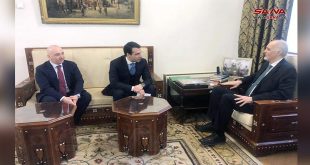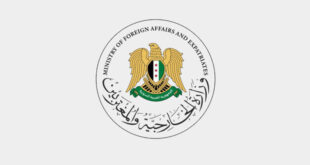Astana, SANA – The guarantor countries of the cessation of hostilities in Syria (Russia, Iran and Turkey) reiterated in a joint statement their efforts to secure the stability and territorial integrity of Syria and their conviction that there can be no military solution to the crisis and that it can be solved only through the political track.
The joint statement, which was read out by Minister of Foreign AffairsKairat Abdrakhmanov, affirmed the guarantor countries’ commitment to strengthening and enhancing the cessation of hostilities agreement and continuing to contribute to confidence-building among the parties in Syria.
The guarantor countries welcome the reduction in the level of violence in Syria after the signing of the memorandum on the establishment of de-escalation zones on May 4, the statement said.
It pointed out that the guarantor states call on all parties to abide by the cessation of hostilities and refrain from violating it and welcome the establishment of a joint working group to reduce tension according to the terms of the memorandum and express satisfaction with the progress in the issue of identifying the de-escalation areas.
The joint working group has been tasked with completing all the technical and operational requirements regarding all these areas and has decided to hold its next meeting on August 1-2 in Iran, the statement said.
It added that the guarantor states emphasize the need that all parties in Syria take measures to increase confidence in order to ensure that the political process and the agreement of cessation of hostilities keep going and secure rapid humanitarian access to all affected areas.
The statement stressed the importance of the role of the Astana meetings, especially with regard to helping consolidate the Geneva process, welcoming the next round of the Geneva talks due to be held on July 10.
It pointed out that the upcoming Astana meeting will be held in the last week of August in the Kazakh capital.
Earlier, the plenary session of the 5th Astana meeting on Syria was held with the participation of the delegation of the Syrian Arab Republic, headed by Dr. Bashar al-Jaafari and the other delegations.
In a press statement at the end of this fifth round of Astana talks, al-Jaafari said that the Turkish attitude has been a negative one since the beginning of the Astana track, and that it has led to modest results in this round.
He pointed out that the goal of participation in the meetings in Astana and Geneva is to push forward any efforts that aim at ending the fighting, helping the Syrians and restoring stability to the country, stressing that the Syrian efforts in this frame have been met with counter-efforts on the part of the Turkish side.
“The Turkish attitude, since the start of the track of Astana process, has been negative, and this negativity has led to modest results in this round, especially with regard to the issues related to the de-escalation zones,” said al-Jaafari, adding that the Turkish side opposed reaching details considering those zones and practiced a blackmail policy in this regard.
He noted that the agenda during this Astana round was to finalize the details of the agreement on de-escalation zones, but the Turkish delegation hindered that.
“I can only say that the Turkish side did everything in its power to hinder reaching positive results that concern the interests of the Syrian people,” said al-Jaafari.
Earlier on the day, the delegation of the Syrian Arab Republicheld a meeting with the UN Special Envoy for Syria Staffan de Mistura on the second day of the fifth round of Astana talks.
Lavrentyev: The establishment of de-escalation zones in Syria needs more work
Head of the Russian delegation to Astana 5th meeting Alexander Lavrentyev affirmed that the meetings of Astana represent an important component in the efforts of the international community to reach a political solution to the crisis in Syria, saying that some progress has been achieved and every step, no matter how small, is step forward.
In a press statement following the at the conclusion of Astana 5th meeting on Wednesday, Lavrentyev said that the parties discussed during the bilateral and tripartite meetings in Astana a wide range of issues and documents that were prepared with a view to be approved, which relate to the establishment of de-escalation zones and the establishment of mechanisms to allow the work of these areas.
He added that work is currently underway on seven documents, including the formation of a coordination center to monitor the situation in these areas.
Lavrentyev added that realistically more work need to be done to get to the formation and establishment of de-escalation zones as the parties have not reached to a final status, noting that this is the goal right now and all the parties will seek to reach it soon because without making a decision on the formation of these areas no one will be actually able to document and approve the package of documents that allow the normal work of these areas.
He pointed out that it is planned to deploy units of the Russian military police to monitor the lines of areas of de-escalation.
“No documents were signed, but we adopted the provision on a joint working group,” Lavrentyev said.
He said that the issues of enhancing confidence have received great attention during this Astana meeting, including the issues of the possibility of delivering humanitarian aid to various areas in need, as well as the issue of missing persons and abductees, in addition to an important issue related to demining in the areas of the world historical monuments such as Palmyra.
He announced that the next meetings of Astana will be held in the last week of next August, but if things require an urgent meeting, a meeting will be held earlier.
De Mistura: We will use progress in Astana to make political progress in Geneva
UN Special Envoy for Syria Staffan de Mistura said that the progress made at Astana 5th meeting was “simple” but “important” and that this progress will be used to make political progress during the upcoming Geneva talks.
In a statement after the end of the fifth round of Astana meetings, de Mistura emphasized that the de-escalation zones are temporary measures whose continuation requires progress on the political level, pointing out that both efforts in Astana and Geneva are necessary and equally important.
De Mistura said that the G20 meeting in Hamburg, Germany, which will include many world leaders, will be an important opportunity for progress in the context of resolving the crisis in Syria.
The upcoming Geneva meeting will be held on July 10th.
On Tuesday, the delegation held two consultative meetings with the Russian delegation, headed by Director of the Middle East and North Africa Department of the Russian Foreign Ministry Sergei Vershinin, and two similar meetings withe Iranian delegation, headed by Assistant Foreign Minister Hossein Jaberi Ansari.
Also yesterday, the guarantor countries of the cessation of hostilities in Syria (Russia, Iran and Turkey) held two sessions of talks at the level of technical experts on the frontiers and maps of the de-escalation zones in Syria.
M. al-Frieh/H. Said/Mazen
 Syrian Arab News Agency S A N A
Syrian Arab News Agency S A N A




